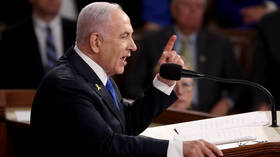‘I’m a dictator,’ Belarusian leader jokes

Just a year and a half on from Belarus' hotly disputed presidential election, the Eastern European nation's long-time leader Alexander Lukashenko has admitted, at least jokingly, that he might not be entirely focused on maintaining a positive public opinion.
Asked to provide his take on the “essence of Belarusian democracy” by a journalist during a major speech during a state-of-the-nation address on Friday, Lukashenko gave an unorthodox review of his 27 years in power.
“I’m a dictator, it’s hard for me to understand democracy,” he responded.
The strongman leader then struck a more serious tone, arguing that his vision of democracy was quite different from the one preached by “the free world and the bastion of democracy – the US.”
“Democracy is the rule of the people. The referendum is an element of democracy,” Lukashenko went on, referring to the upcoming public vote on sweeping constitutional changes scheduled for late February. “These are the rights of the people. But rights and immediate duties ... and real freedom within the boundaries of the law.”
The proposed constitutional changes have been pitched as drastic amendments to the government structure of Belarus. Namely, the new constitution, if adopted, will greatly empower the so-called All-Belarusian People’s Assembly – a general meeting of the Belarusian government with industry leaders and top officials held every five years. Lukashenko has previously said he will step down once the reforms are passed.
The assembly, which currently lacks any real power, will be able to depose a president found guilty of “systematic” violation of the constitution or other “serious” offenses, as well as to void any act by any government body except for courts should it be deemed damaging for “national security.”
However, opposition activists insist the move is simply a delaying tactic designed to buy Lukashenko time in the wake of mass unrest following the 2020 election, which most foreign observers say was rigged in his favor. Tens of thousands of people took to the streets to demand a fresh vote, with heavily-armed security forces dispersing the crowds with tear gas and embarking on a campaign of mass arrests. The vast majority of those involved in the political campaign against Lukashenko are now in jail or have fled abroad, and those sharing opposition material on social media or following a number of anti-government outlets face arrest.
The proposed constitutional changes, conceived following the turbulent aftermath of the contested 2020 elections and the protests that followed, would also impose a hard limit on the presidential term, allowing an individual to stay in office for only two five-year periods. Still, the proposed change applies only to “newly elected presidents,” potentially allowing Lukashenko to stay in power for another decade after his current term ends in 2025.













